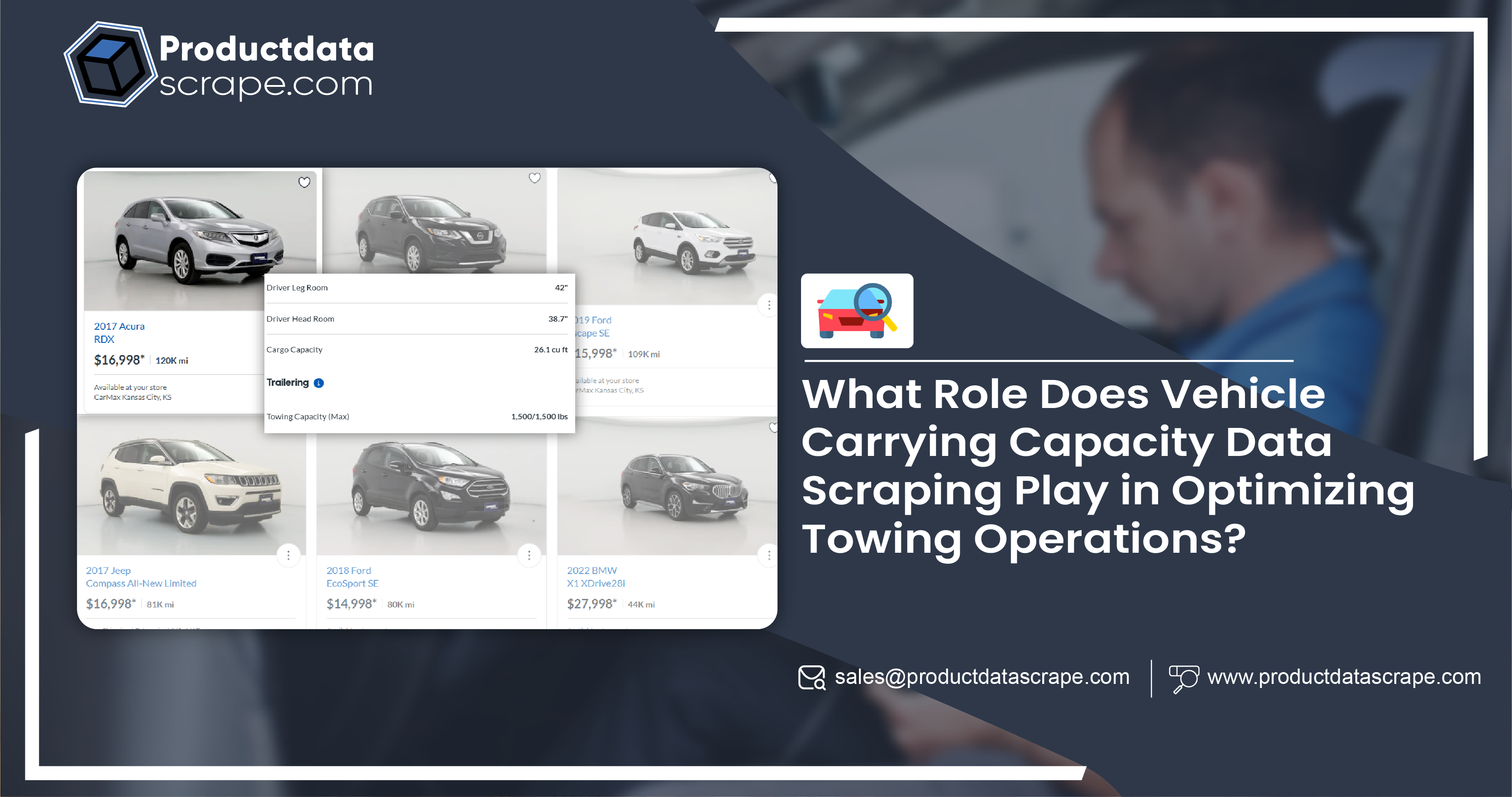
Introduction
Web scraping is a powerful tool that allows you to extract data from websites for various purposes, including gathering information about vehicle specifications like Gross Vehicle Weight Rating (GVWR), Payload, Curb Weight, Vehicle Length, and Wheelbase. In the automotive industry, understanding the carrying capacity of vehicles with hitches is crucial for individuals and businesses involved in towing, RVing, or heavy-duty vehicle use. Websites like Edmunds.com, Cars.com, and CarMax.com offer detailed information about vehicle specifications, including carrying capacity, making them ideal candidates for web scraping projects.
In this blog, we will explore how web scraping can be used to gather the necessary data from these platforms. We will focus on extracting key metrics related to a vehicle's towing and carrying capacity, which is critical for users who need to know the maximum load a vehicle can handle, especially when equipped with hitches. Vehicle carrying capacity data scraping is essential to ensure accurate data extraction from automotive websites, providing users with the information they need for informed decisions. Additionally, Web scraping vehicle payload data can be used to obtain detailed specifications, such as the maximum payload a vehicle can carry, ensuring that users select the right vehicle for their needs.
Understanding Key Metrics for Vehicle Carrying Capacity
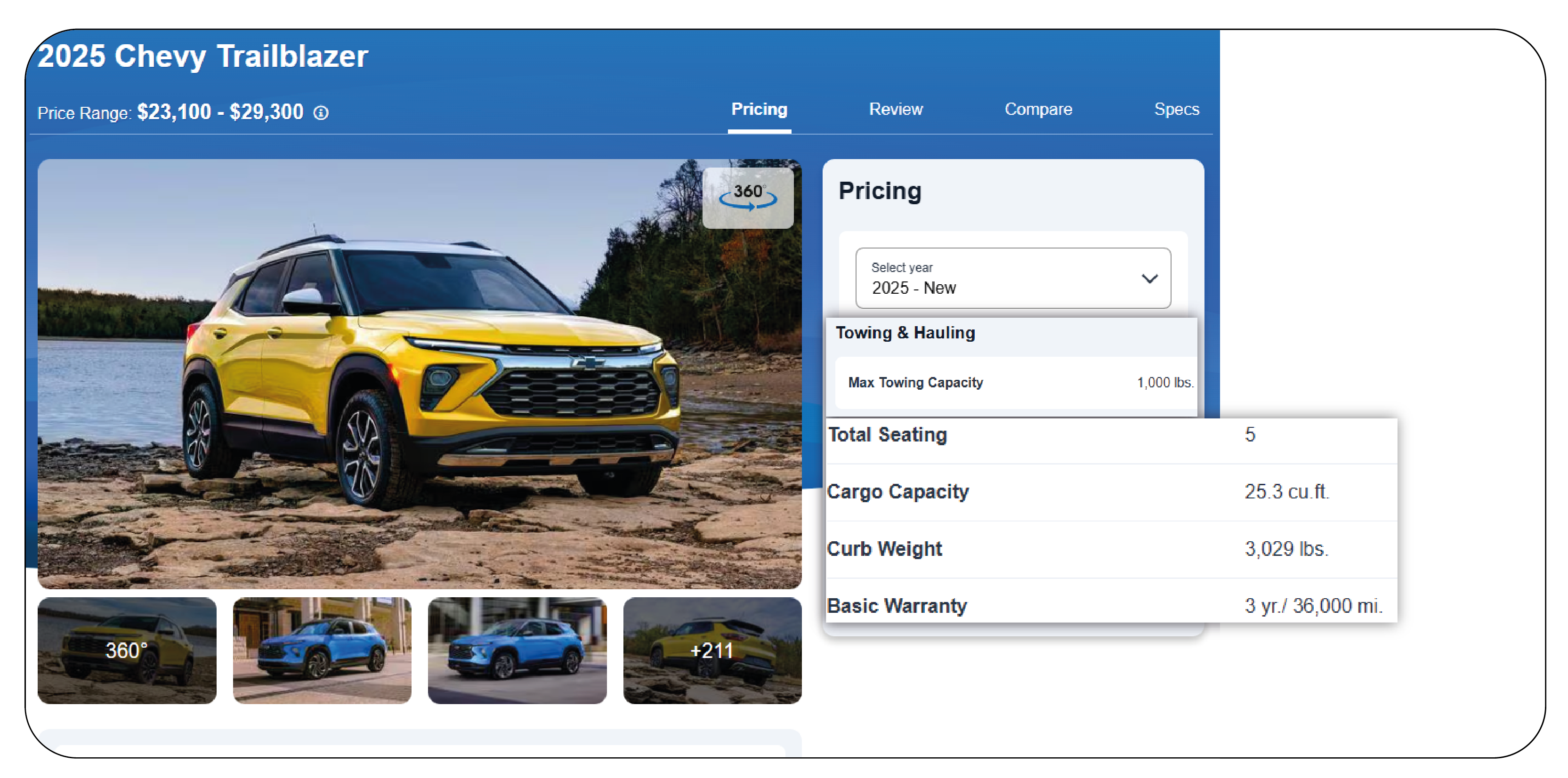
Before diving into the web scraping process, it is essential to understand the specific data points we are looking to extract. The following metrics are essential when assessing the carrying capacity of a vehicle with a hitch:
1. Gross Vehicle Weight Rating (GVWR): This refers to the maximum weight a vehicle is rated to carry safely, including the vehicle's weight, passengers, cargo, and any additional equipment like hitches or towing setups. It is typically measured in pounds (lbs) and indicates the vehicle’s total capacity.
2. Payload: Payload refers to the maximum weight a vehicle can carry, excluding its weight and any equipment or cargo it is towing. This metric is crucial when determining how much cargo a vehicle can safely carry, especially when loaded with passengers or other gear.
3. Curb Weight: This is the total weight of the vehicle with all standard equipment, fluids (e.g., fuel, oil), and the driver, but without any passengers or cargo. It helps determine how much weight can be added to the vehicle without exceeding the GVWR.
4. Vehicle Length: The length of a vehicle is essential when considering how much space is available for carrying or towing large items, especially when using a hitch. The vehicle length also contributes to the overall towing dynamics, affecting maneuverability.
5. Wheelbase: This is the distance between the front and rear axles of the vehicle. A longer wheelbase generally provides better stability and handling when towing heavy loads.
Why These Metrics Matter?
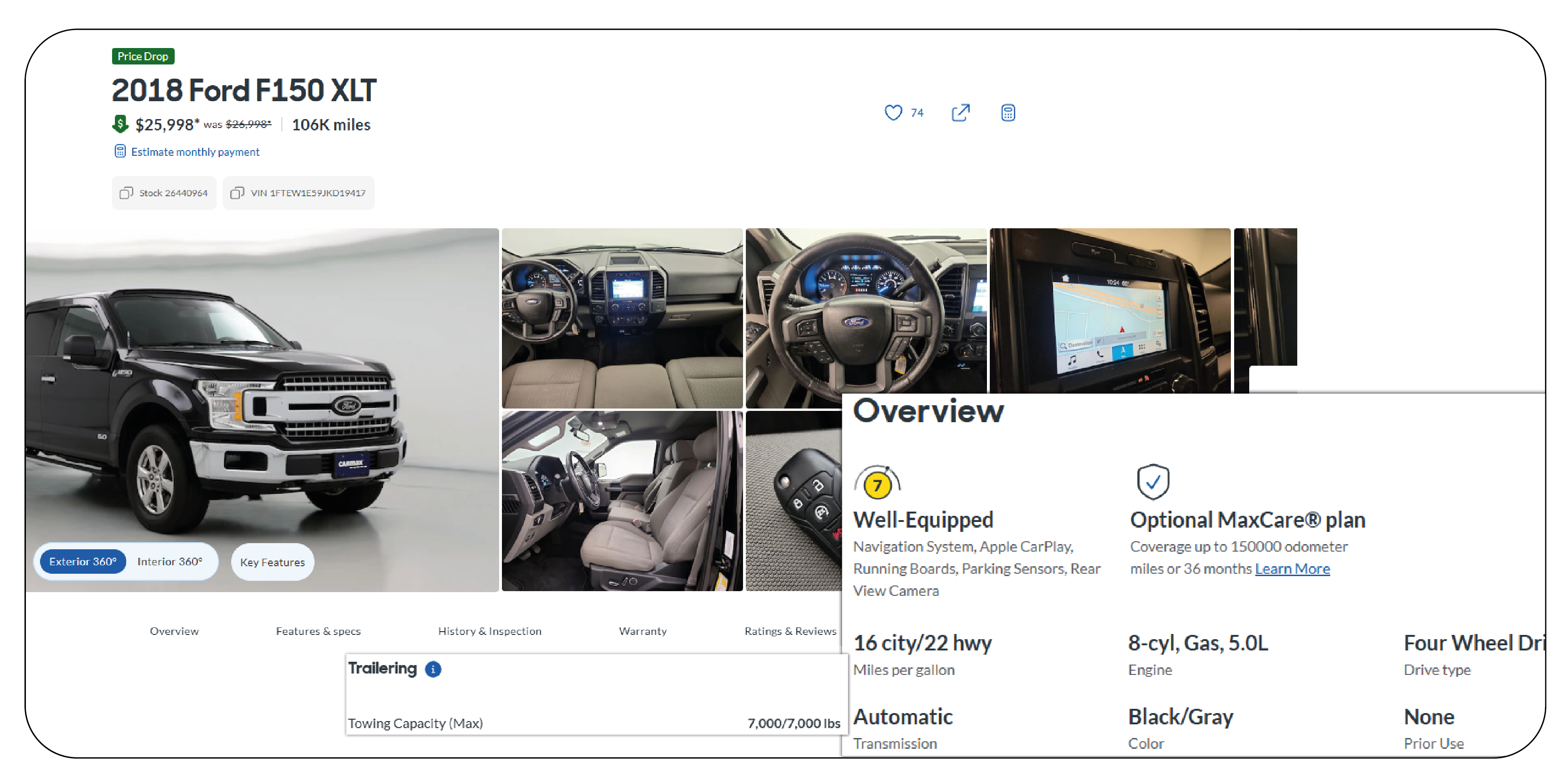
The carrying capacity of a vehicle with a hitch is essential for several reasons:
-
Towing: When using a vehicle for towing, it’s essential to understand the towing and payload capacity to prevent overloading. Exceeding these limits can result in severe consequences, including vehicle damage, decreased safety, and the potential to void warranties. Towing with a vehicle that doesn’t have the appropriate capacity can lead to engine failure, transmission issues, and compromised handling, all of which could endanger the driver and passengers. Extract vehicle GVWR information to ensure users select a vehicle adequately equipped to handle towing demands, keeping safety and reliability intact.
-
Safety: Having precise knowledge of vehicle specifications such as Gross Vehicle Weight Rating (GVWR), payload capacity, and towing limits is vital for ensuring the vehicle operates within safe limits. Overloading a vehicle can negatively affect its braking system, suspension, and tire pressure, increasing the risk of accidents or breakdowns. Carrying capacity data extraction through web scraping tools can help vehicle owners or businesses access up-to-date and accurate information, ensuring they operate their vehicles safely and in line with manufacturer recommendations. Users can avoid the dangers of under-informed towing practices by scraping this data from trusted sources like Edmunds, Cars.com, and CarMax.
-
Compliance: Many regions have stringent regulations governing the safe towing capacities and weight limits of vehicles to prevent accidents and ensure road safety. These regulations may vary by jurisdiction, but they typically enforce specific weight restrictions based on the type of vehicle and its intended use. Users can gather detailed information on their vehicle’s capabilities and ensure they comply with local laws by utilizing vehicle weight and payload scraping techniques. Regular Gross Vehicle Weight Rating (GVWR) data scraping allows businesses and individuals to stay updated with the latest guidelines, helping them avoid legal troubles while ensuring their vehicles are roadworthy and safe to use.
-
Performance: Understanding a vehicle’s towing capacity, GVWR, and payload limits is key in evaluating how a vehicle will perform under load. These metrics influence factors such as fuel efficiency, driving dynamics, and overall comfort. Overloading a vehicle can strain its engine, suspension, and braking systems, leading to poor fuel economy and a less comfortable driving experience. By leveraging tools for carrying capacity data extraction, users can evaluate the performance of different vehicles under towing conditions and make informed choices about the vehicle that best suits their needs. This data not only aids in optimizing performance but also enhances long-term durability by preventing overburdening the vehicle. Additionally, price monitoring tools can be used alongside this data to track fluctuations in vehicle prices based on specifications, helping users make cost-effective decisions.
The Role of Web Scraping
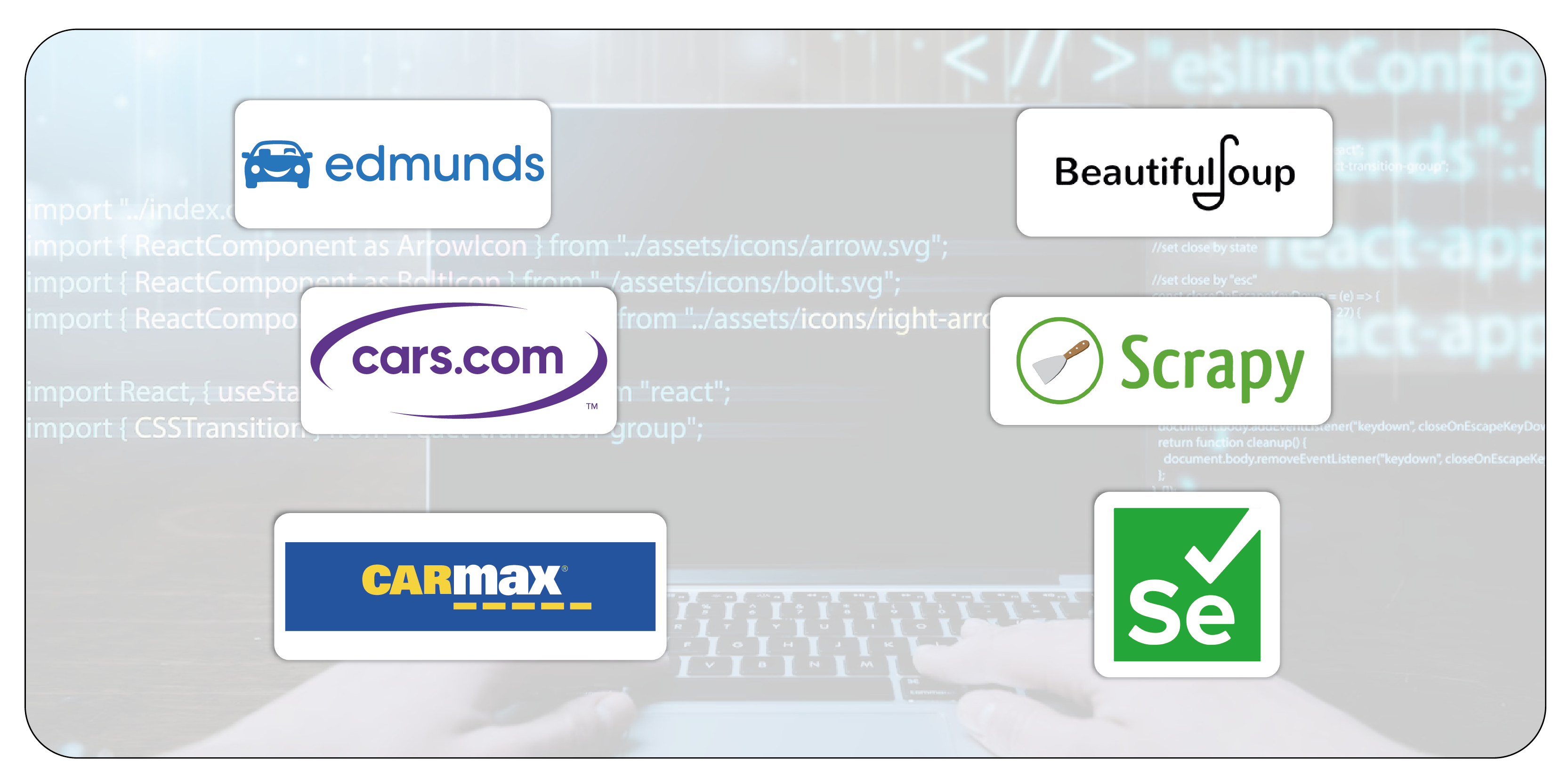
Web scraping tools can automate gathering data from these car sales websites, where detailed vehicle specifications are often listed. Instead of manually searching through thousands of vehicles, web scraping allows you to pull relevant data in bulk, save time, and generate insights in a structured format.
For example, using Python libraries like BeautifulSoup or Scrapy or browser automation tools like Selenium, you can navigate through each vehicle listing on Edmunds.com, Cars.com, or CarMax.com, and extract the necessary specifications. By configuring your scraping script to focus on the target data points (GVWR, Payload, Curb Weight, Vehicle Length, Wheel Base), you can easily compile a dataset for further analysis.
Choosing the Right Website for Scraping
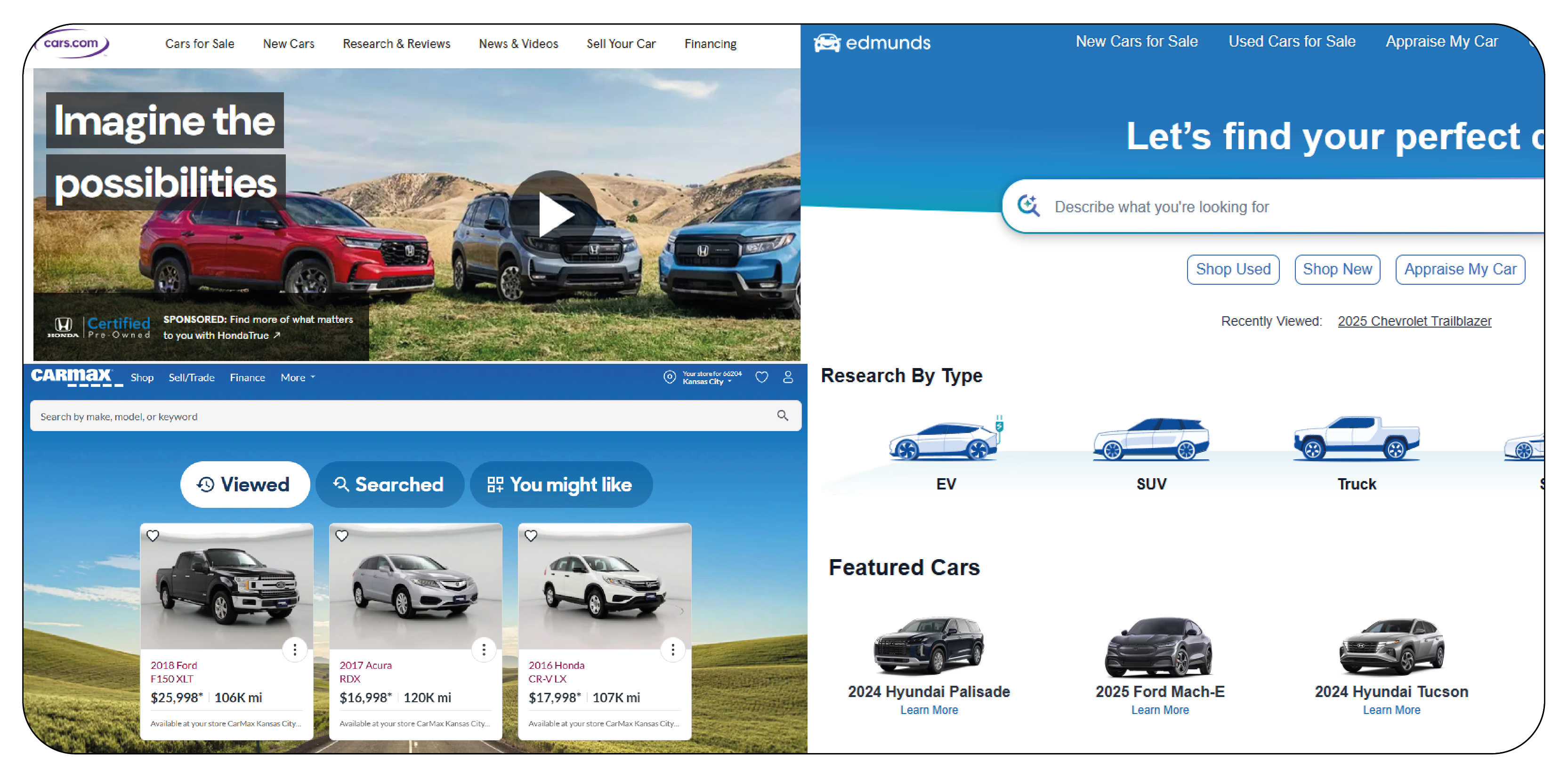
Each of these websites – Edmunds.com, Cars.com, and CarMax.com – offers vehicle data, but the structure and accessibility of the data can vary. Let’s take a closer look at each platform:
-
Edmunds.com: Edmunds provides various vehicle reviews, pricing, and detailed specifications. It also allows users to filter vehicles by make, model, and year, making it easy to narrow down results. Edmunds tends to have well-organized data, and vehicle specification tables are often presented in a standardized format, making it an excellent target for scraping.
-
Cars.com: Cars.com is another excellent source of vehicle data. It includes user reviews, pricing, and detailed specifications for new and used vehicles. The platform’s vehicle listing pages often display key metrics such as GVWR and Payload, making it suitable for extracting carrying capacity data.
-
CarMax.com: CarMax offers a similar set of specifications for vehicles available for purchase, including data on weight and towing capabilities. As a used-car retailer, CarMax’s listings provide essential insights into vehicles’ capacities, but it may not have as comprehensive a set of towing metrics as Edmunds or Cars.com.
Challenges in Web Scraping Automotive Data
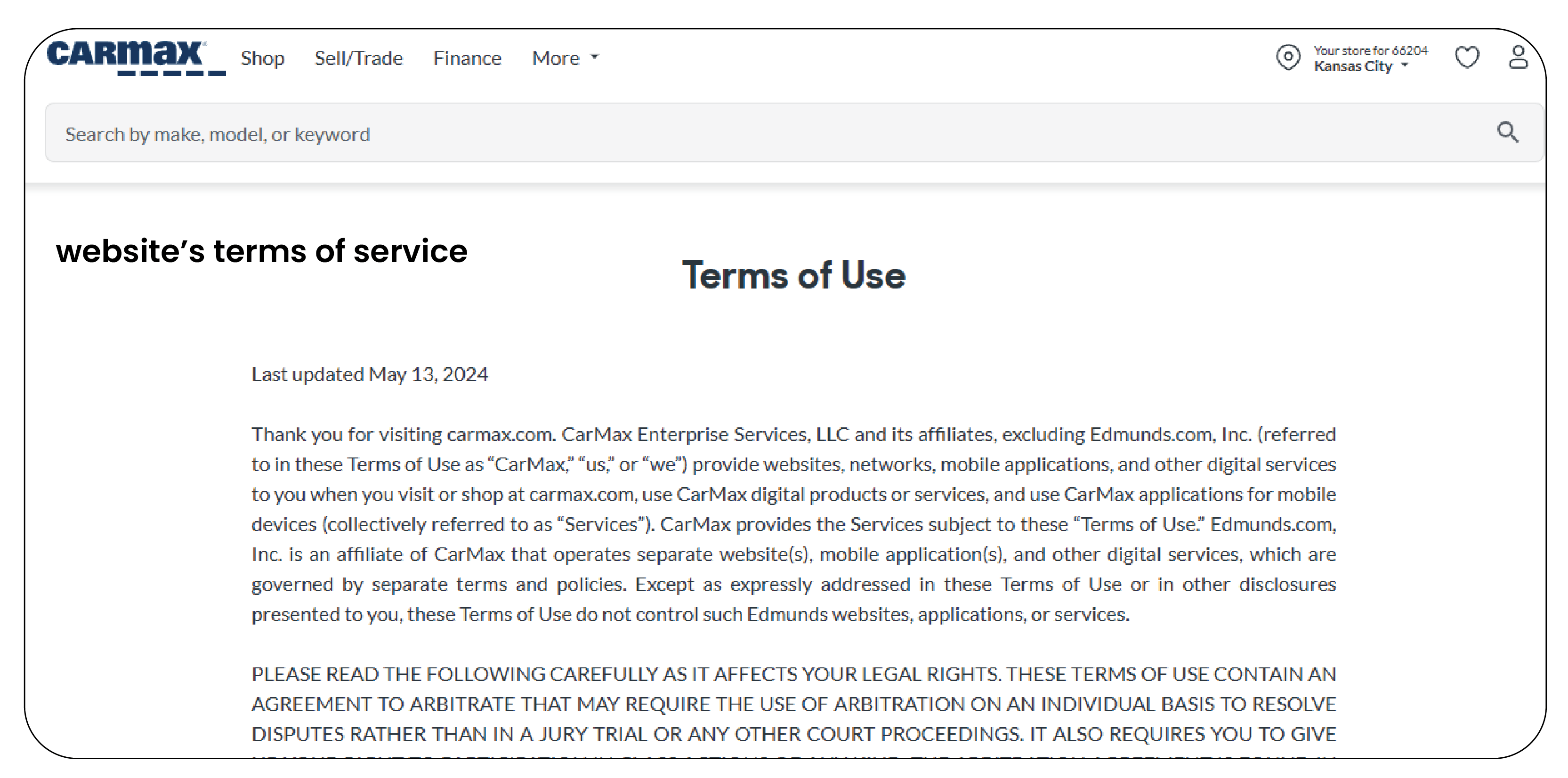
While web scraping can be a highly effective method of gathering vehicle data, it comes with a set of challenges:
-
Website Structure Changes: Websites frequently update their layouts and structures. Scraping code that works today may break tomorrow if the website changes. Regular monitoring and adjustment of scraping scripts are necessary.
-
Anti-Scraping Measures: Many websites implement anti-scraping technologies, such as CAPTCHAs, IP blocking, and rate limiting. Overcoming these measures requires sophisticated techniques like rotating IPs, headless browsing, or scraping proxies.
-
Data Variability: Different websites may present the same data in different formats or units (e.g., pounds vs. kilograms), making it difficult to aggregate the data into a consistent format. Scraping code must account for these differences and normalize the data.
-
Legal and Ethical Considerations: Web scraping must always comply with the website’s terms of service. Unauthorized scraping can lead to legal action, website blocking, or damaging a company’s reputation. Ensuring that scraping is done ethically and within legal boundaries is essential.
Benefits of Scraping Vehicle Carrying Capacity Data
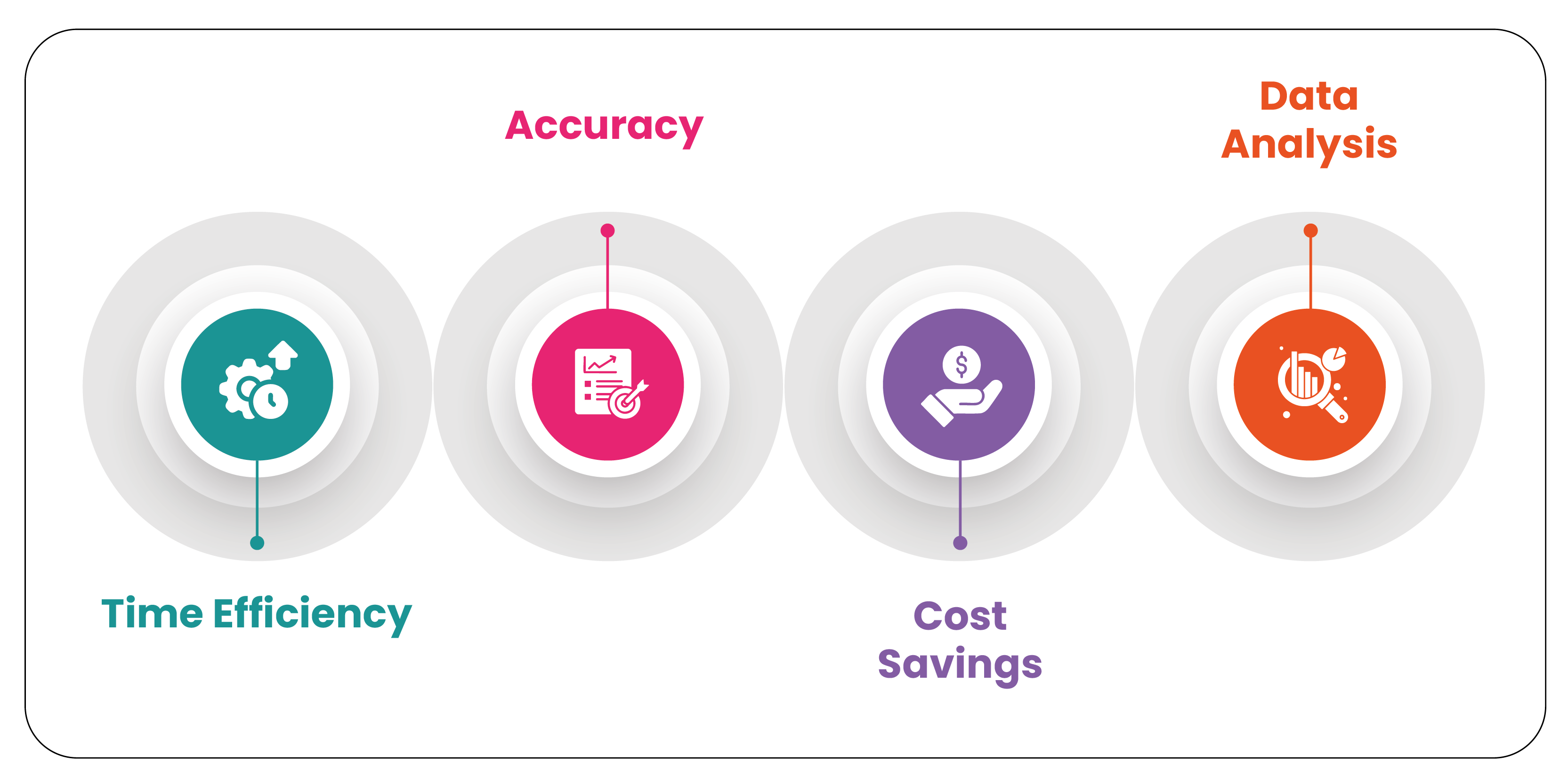
Scraping websites like Edmunds.com, Cars.com, and CarMax.com for vehicle specifications related to carrying capacity offers several advantages:
-
Time Efficiency: Conducting manual research on vehicle carrying capacity, including aspects like towing limits, payload, and Gross Vehicle Weight Rating (GVWR), can be an extremely time-consuming process. Gathering this data from multiple sources often requires sifting through numerous vehicle listings and specifications, which can take hours or even days. However, with web scraping automotive data, the entire process can be automated, allowing users to quickly gather large volumes of data without relying on manual input. This saves users significant time, allowing them to focus on more critical aspects, such as analyzing the data and making informed decisions. Additionally, real-time vehicle data scraping ensures that users can access the most up-to-date specifications as they change over time.
-
Accuracy: One of the significant challenges with manual data collection is the potential for human error. It's easy to misinterpret numbers or overlook key details when researching vehicle specifications, especially when dealing with complex data such as vehicle wheelbase and length. Web scraping eliminates this risk by extracting data directly from trusted sources, ensuring the information collected is precise and consistent. By leveraging vehicle wheelbase and length extraction, users can guarantee that every aspect of the vehicle's specifications is captured correctly without missing any important details. This level of accuracy is crucial when dealing with critical metrics that directly impact vehicle performance and safety.
-
Cost Savings: Traditional methods of collecting vehicle data often involve hiring third-party services or relying on manual labor, which can be expensive. Users can significantly reduce costs by automating the data collection process by utilizing web scraping tools. Instead of paying for costly reports or inefficient methods, scraping allows businesses and individuals to gather detailed vehicle data, such as car trim level data scraping, without needing external help. The financial savings provided by web scraping tools make it an attractive option for companies seeking large-scale vehicle information without breaking the budget.
-
Data Analysis: With an extensive dataset collected through web scraping, users can analyze trends across various vehicle attributes, including payload, towing capacities, and other critical specifications. Access to a large, well-organized dataset opens up opportunities for deeper insights, enabling businesses and consumers to make better-informed decisions when selecting vehicles for towing, RVing, or heavy-duty use. For example, analyzing vehicle wheelbase and length variations across different car trims or comparing various brands allows for more nuanced recommendations. Whether it’s evaluating vehicle weight and payload scraping results or analyzing car trim level data scraping for specific models, accessing and analyzing data efficiently helps drive better purchasing decisions, ensuring that users select the right vehicles for their needs.
Applications of the Scraped Data
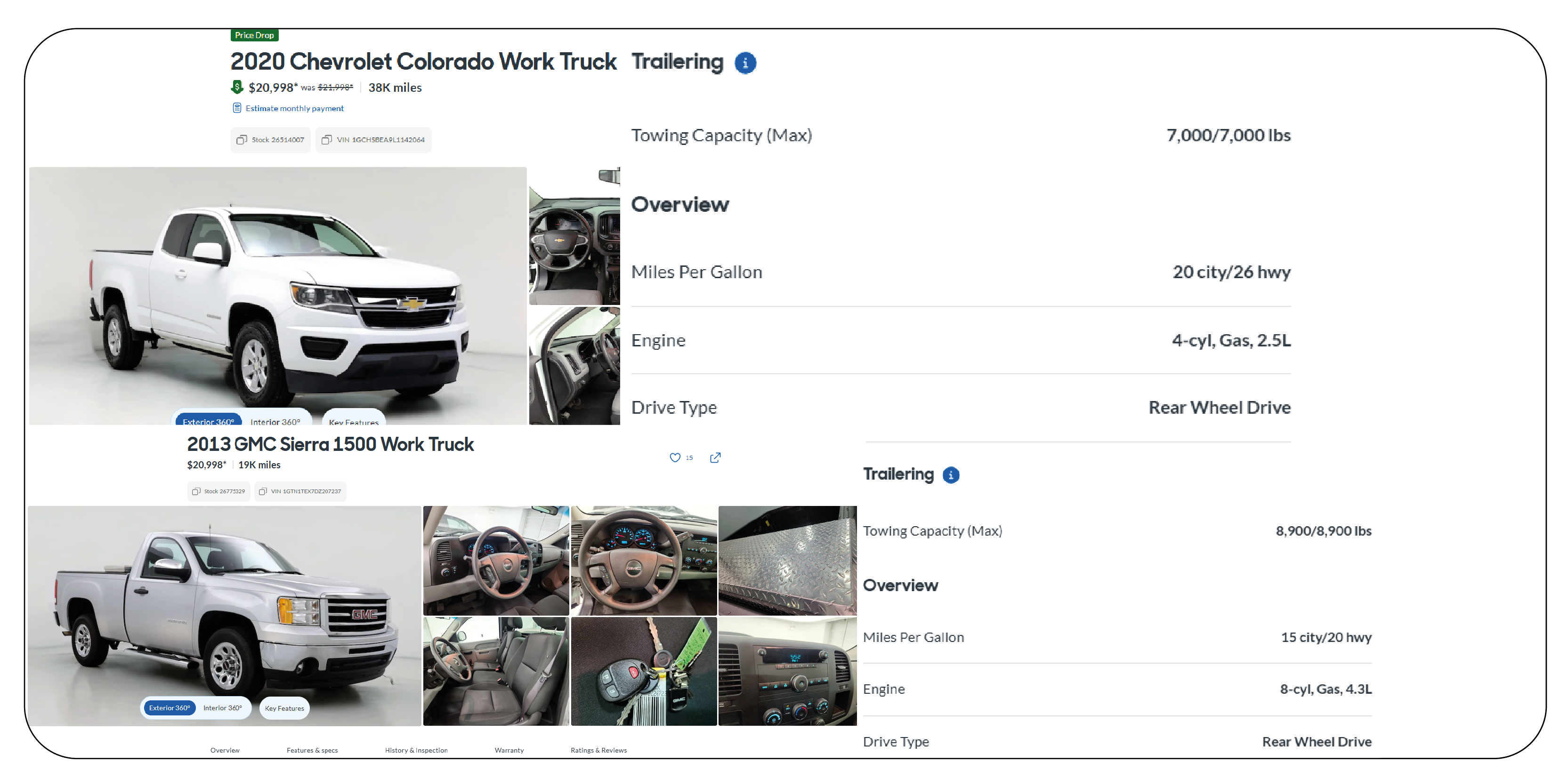
Once you have gathered data on vehicle carrying capacities, there are several ways it can be applied:
1. Towing Calculators: The data can be used to build or improve towing calculators, allowing users to input their needs and find vehicles with the appropriate carrying capacity for their specific requirements.
2. Market Research: Car manufacturers, dealerships, and research organizations can use the data to understand market trends, such as consumer preferences for high-capacity vehicles or the popularity of specific vehicle types.
3. Vehicle Comparisons: Having easy access to this kind of scraped data can benefit individuals or businesses looking to compare vehicles based on towing and payload capacity.
4. Fleet Management: Companies that manage fleets of vehicles can use this data to optimize their operations by choosing the right vehicles with the appropriate carrying capacity for specific tasks.
Conclusion
Web scraping is a valuable tool for extracting data on vehicle carrying capacities, especially from websites like Edmunds.com, Cars.com, and CarMax.com. By gathering critical specifications such as GVWR, Payload, Curb Weight, Vehicle Length, and Wheelbase, you can make data-driven decisions for both personal and business purposes. While challenges like website structure changes and anti-scraping measures exist, the benefits of automating data collection far outweigh the difficulties. With accurate and timely data, users can optimize vehicle choices, enhance towing and payload capabilities, and improve operational efficiency.
In addition, the techniques used in web scraping e-commerce websites can be adapted to automotive data scraping, enabling users to extract valuable vehicle information efficiently. For businesses, eCommerce dataset scraping helps obtain vehicle specifications and provides insights into market trends and competitor analysis. This data can be instrumental in shaping a sound pricing strategy, ensuring businesses remain competitive while offering vehicles that meet customer needs for towing and payload capacities.
At Product Data Scrape, we strongly emphasize ethical practices across all our services, including Competitor Price Monitoring and Mobile App Data Scraping. Our commitment to transparency and integrity is at the heart of everything we do. With a global presence and a focus on personalized solutions, we aim to exceed client expectations and drive success in data analytics. Our dedication to ethical principles ensures that our operations are both responsible and effective.








































.webp)






